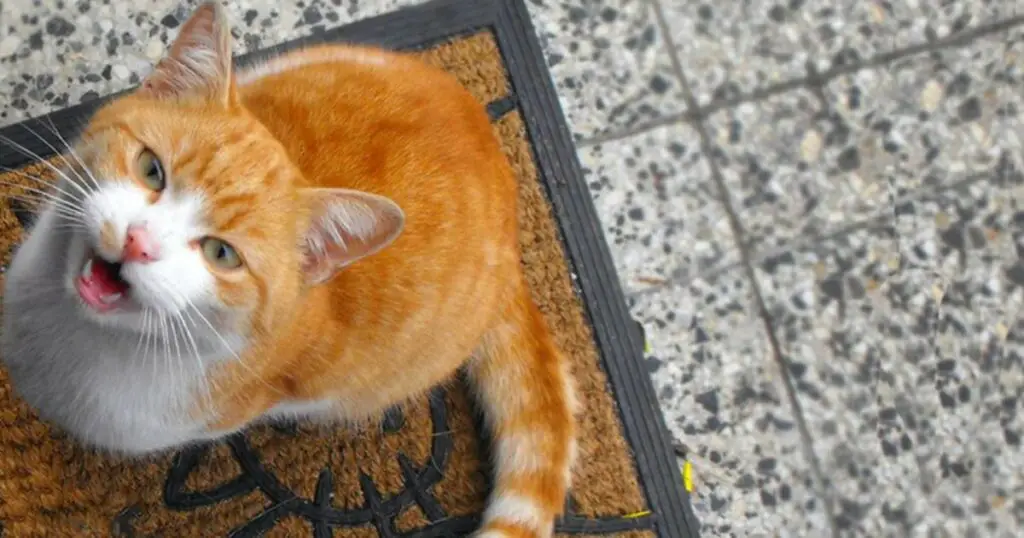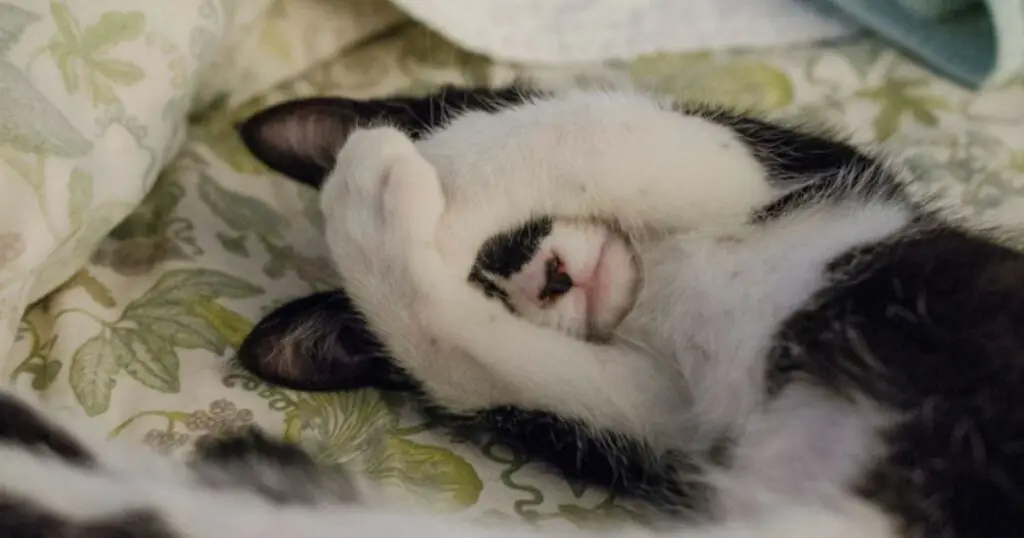Why Are Cats More Active At Night? 🤔
Cats are most active at night because they are nocturnal animals. This means that they are naturally more active during the night hours when it is dark outside.
Cats are also crepuscular, meaning they are most active during the twilight hours of dawn and dusk.
This is because cats are predators and their prey is most active during these times.
Cats also have better night vision than humans, which helps them to hunt more effectively in the dark.
1. Cats are naturally nocturnal animals
Have you ever found yourself stirred awake in the midst of a quiet night by the faint sounds of playful paws or a distant meow?
There’s a whimsical allure in realizing that while most of the world slumbers, our feline companions are buzzing with energy.
Cats, by nature, are nocturnal creatures, ingrained with ancient habits from their wild ancestors. Imagine, generations ago, a cat prowling the moonlit jungles or stalking silently through tall grasses, driven by instincts that have been passed down to our modern-day house cats.
These mysterious midnight antics, though sometimes a puzzle to our sleep-bound human minds, remind us of the profound bond we share with nature, even within the cozy confines of our homes.
When next you hear that familiar midnight jingle of a cat toy or the soft padding of feline feet, take a moment to marvel at this beautiful relic of their wild lineage.
It’s a humbling reminder that even our closest companions have stories and rhythms that extend far beyond our immediate understanding.
2. Cats have better night vision than humans

Have you ever stumbled around your home in the dark, cursing under your breath at every unseen obstacle, only to see your cat gliding effortlessly through the shadows?
It’s almost as if they possess a magical sixth sense, but the secret lies in their extraordinary night vision.
Cats see the world at night in a way we humans can only dream of. While our pupils merely dilate to let in more light, a cat’s eyes transform, turning them into luminous orbs that capture even the faintest glimmers.
This impressive ability isn’t just a quirk of evolution; it’s a throwback to their wild ancestors who hunted under the silvery glow of the moon. Just thinking about it gives me a sense of awe.
I often recall a time when I watched my own feline friend, Luna, fixate on something invisible to me in the night. Her focus, sharp and unwavering, made me wonder about the vibrant tapestry of colors, shapes, and movements she must be witnessing in the darkness.
It’s moments like these that remind me that the world is so much more vast and intricate than we perceive, and that our beloved pets might just have a sprinkle of magic in them after all.
See also: How to Find a Lost Indoor Cat – The Ultimate Guide
3. Cats are less likely to encounter predators at night
One of the more pragmatic reasons cats tend to prowl the night is to evade potential threats.
In the stillness of the night, the world quiets down and many predators retreat, giving cats a relative sense of safety in the darkness. It’s a dance of strategy that has roots in their wild lineage.
My own childhood cat, Marmalade, was an expert at this. Each evening, he would confidently venture out, sensing the security the night offered him, returning each morning with tales told through whisker twitches and purring.
His nocturnal routines became a testament to the deep-seated instincts of cats, a clever evolutionary tactic for survival.
The next time you see your cat staring intently into the evening, consider the ancestral wisdom that guides them, and marvel at the intricate dance between prey and predator that has shaped their behavior.
It’s a beautiful, silent ballet that plays out under the cover of darkness, every single night.
See also: Do foxes attack cats?
4. Cats are more likely to find food at night
Picture this: It’s a chilly evening, the world bathed in a muted blue light, and while most of us are snuggled under blankets, perhaps sipping on a cup of chamomile tea, our feline friends are gearing up for a gastronomic adventure.
You see, the cover of night provides cats with a buffet of opportunities, especially when it comes to food. With fewer humans around and nocturnal critters coming alive, the chances of stumbling upon a stray morsel or catching a sneaky mouse become significantly higher.
My grandmother used to recount tales of her mischievous cat, Whisky, who would regularly return at dawn with a triumphant gleam in his eye and, occasionally, a ‘gift’ for her doorstep.
She’d joke that while we dreamt of sugarplums, Whiskers was out hosting his own midnight feasts. It’s a delightful thought, isn’t it? That while we rest, our cats live out stories of culinary conquests under the starry skies.
Their nocturnal habits, passed down from their wild ancestors, not only give them a better shot at a lavish supper but also weave a fascinating tale of adaptability and instinct that we’re privy to witness every night.
So, the next time your cat dashes out just as you’re winding down, spare a thought for their epicurean escapades, and maybe, just maybe, leave out an extra treat for their return.

5. Cats are less likely to encounter humans at night
As we retreat to our beds, cats seize this opportunity to roam free, unhindered by the rush and rumble of human activity.
Ever thought about why your feline friend might prefer this quieter, darker world? One obvious reason is the reduced chance of crossing paths with us unpredictable two-legged beings.
In my younger years, I lived in a busy neighborhood where my cat, Marmalade, would smartly wait until the noise died down before embarking on his nightly adventures.
It became our little routine: as I’d pull down the blinds, he’d start stretching, preparing for his midnight rendezvous.
To him, the night presented a tranquil sanctuary, free from cars zooming by, children playing, or folks going about their day. It was his realm, where he could be the true master of his domain without the often chaotic interruptions brought on by humans.
This natural nocturnal inclination is a poignant reminder that, beneath our domesticated pets’ loving purrs and playful antics, lies a deep-seated instinct, a nod to their wilder roots where avoiding larger predators – including humans – was key to survival.
So, the next time dusk descends and your feline companion seems eager for adventure, take a moment to appreciate the age-old instincts guiding them and the magical world they get to explore, just beyond our human touch.
See also: Best GPS Cat Tracking Devices
6. Cats are more likely to find mates at night
While we might associate the night with sleep and dreams, for many felines, it’s a time of moonlit rendezvous and whispered purrs.
Yes, the night-time often serves as the perfect backdrop for feline courtship. With fewer disturbances and the cloak of darkness for privacy, cats find it an ideal time to seek out potential mates.
I recall a summer night when, from my window, I spotted two cats on the garden wall, their tails raised high, eyes shining with mutual intrigue. It was a fleeting but poignant moment, hinting at the intricate love stories our pets might be living, unbeknownst to us.
Every rustle in the bushes or soft meow carried by the breeze could be a chapter in an age-old dance of attraction. It’s a world of whispered secrets and furtive glances, all playing out beneath the silent watch of the stars.
For our feline friends, night time is not just about hunting or exploring; it’s also about connecting, about finding that purrfect companion amidst the serene backdrop of the night.
So, next time you hear a soft mewl or a playful chase outside, remember: the night is young, and in the world of cats, romance is very much alive.
Final Thoughts on Feline Night Owls
From their innate instincts shaped by wild ancestries to the ways they navigate love and survival under the cloak of darkness, cats undeniably have an intricate relationship with the night.
These multifaceted reasons, be it their superior night vision, the dance of survival, or their quest for romantic connections, all paint a captivating picture of their night-time escapades.
As we wrap up our exploration, let’s remember that every time our whiskered companions slip into the shadows or engage in their mysterious rituals, they are echoing a deeply entrenched, ancient symphony of nature.
So, the next evening, as you settle in and perhaps hear the distant sound of a cat’s serenade, take a moment of gratitude and wonderment for the complex, beautiful world of cats that unfolds right outside our doors.
Sweet dreams to you, and may your feline friends always find joy in their midnight adventures. 🌙🐾



